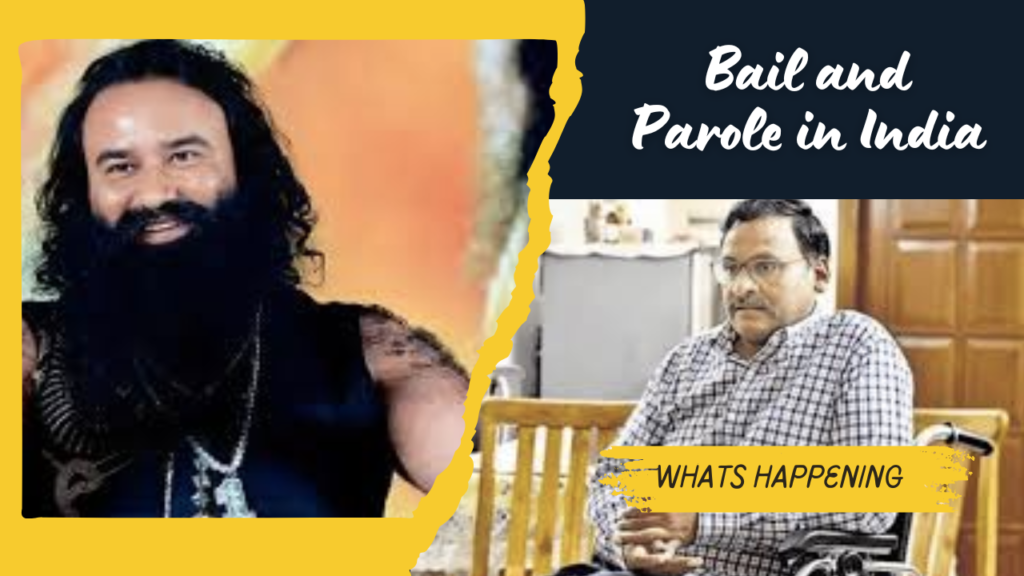The Indian criminal justice system has often come under scrutiny for its inconsistencies and systemic challenges in granting bail and parole in India. Recent cases involving G.N. Saibaba and Gurmeet Ram Rahim Singh highlight some glaring discrepancies that raise critical questions about fairness and the rule of law. Let’s dive deeper into the bail and parole issues in India, and understand how these cases shed light on broader systemic problems.
G.N. Saibaba vs. Gurmeet Ram Rahim Singh: A Tale of Two Contrasts
G.N. Saibaba, a former professor suffering from over 90% disability, spent nearly a decade in prison without securing bail. Despite his dire medical condition during the COVID-19 pandemic and the passing of his mother, he was denied both bail and parole. His ordeal came to an end when the High Court found him not guilty of the charges against him.
In stark contrast, Gurmeet Ram Rahim Singh, despite facing severe charges, managed to obtain parole frequently, especially before elections. This raises crucial questions about how the criminal justice system functions in granting bail and parole in India and whether it is biased or prone to manipulation.
Bail and Parole in India – Issues: Overcrowded Prisons and Lack of Data
One of the most pressing issues in the Indian penal system governing bail and parole in India is the overcrowding of prisons. Despite a large number of undertrial prisoners, there is no reliable data on those who spend less than a year in jail. This lack of data not only prevents effective policy-making but also highlights the system’s inefficiencies. On any given day, more people are entering prisons than being released, worsening the overcrowding problem.
Bail and Parole in India – Issues: Overuse of Serious Charges by Law Enforcement
Law enforcement agencies in India tend to file FIRs with the most serious charges available. This often makes securing bail more difficult, even in minor cases. Vulnerable individuals are frequently re-arrested and charged with multiple offenses, creating a vicious cycle where they face numerous charges, often without any substantial evidence against them.
Bail and Parole in India – Issues: Judicial Reluctance and Solvency Requirements for Bail
There is often a reluctance in the lower judiciary to grant bail, leading to prolonged detentions. Lower courts tend to pass the responsibility of granting bail to higher courts, and in many cases, strict solvency requirements are imposed. Individuals who do not own property or have financial support struggle to meet these requirements, even in cases where the bail amount is minimal.
Bail and Parole in India – Issues: Liberal Jurisprudence vs. Reality
While the Supreme Court of India has established several precedents in favor of liberal jurisprudence for granting bail and parole in India, this remains largely theoretical for those facing petty offenses. Individuals from lower socio-economic backgrounds lack the resources to file appeals and often do not have adequate legal representation. As a result, they remain trapped in the system without a fair chance to secure bail.
Bail and Parole in India – Issues: Undertrials and Socio-Economic Disparities in Indian Prisons
Shockingly, around 75% of the prison population in India consists of undertrials. These individuals, many of whom come from marginalized communities, often lack access to proper legal representation. Additionally, 80% of the prisoners have special needs, ranging from physical or mental health issues to women inmates who are pregnant or have young children.
Key Takeaways for Reforming India’s Bail and Parole System
The cases of G.N. Saibaba and Gurmeet Ram Rahim Singh underscore the pressing need for reforms in the bail and parole system in India. The current system’s overuse of serious charges, reluctance to grant bail, and financial barriers disproportionately affect those from disadvantaged backgrounds. Here are a few key points that need to be addressed:
- Data Collection and Transparency: Accurate records of all prisoners, including those serving less than a year, need to be maintained to understand the scale of the problem and to inform policy decisions.
- Judicial Sensitivity: Lower courts should be empowered and encouraged to grant bail where appropriate, reducing the burden on higher courts and ensuring quicker justice.
- Fair Financial Requirements: The bail system should be reformed to accommodate individuals without financial means or property, removing the need for excessive solvency documents.
- Focus on Undertrials: Given that the majority of the prison population consists of undertrials, there is a need for fast-track courts or alternative mechanisms to expedite their cases.
India’s bail and parole system faces significant challenges that disproportionately impact vulnerable groups. While high-profile cases like those of G.N. Saibaba and Gurmeet Ram Rahim Singh bring these issues to light, there is a broader need for reforms to create a more just and equitable system. By addressing these systemic flaws, India can ensure that its justice system works fairly for all citizens, regardless of their socio-economic status.
Click here to read about our recent article – Consensual Relationships Do Not Constitute Rape Under Promise of Marriage
You can click here for more Legal news






